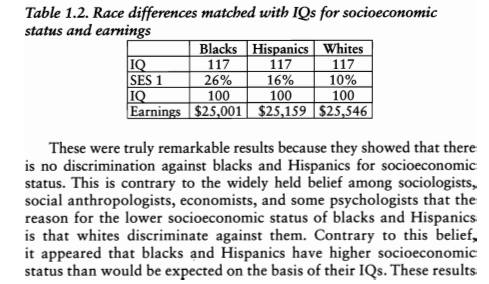In book The Global Bell Curve by Richard Lynn, there is the following table:
Herrnstein and Murray addressed the problem of how far the lower socioeconomic status and earnings of blacks and Hispanics can be explained by their lower IQs. These analyses were confined to men and were conducted for socioeconomic status by matching whites, blacks, and Hispanics for IQ. First, they took all those with an IQ of 117 (the average IQ of those in SES 1), and looked at the percentages of those with IQs of 117 who were in SES 1. They found that blacks with an IQ of 117 were much more likely than whites to be in SES 1 (26 percent as compared with 10 percent), and Hispanics with an IQ of 117 were also more likely than whites to be in SES 1 ( 16 percent as compared with 10 percent) (p. 321). The apparent advantage of blacks and Hispanics for socioeconomic status did not, however, hold for earnings. For these Herrnstein and Murray (p. 321) matched whites, blacks, and Hispanics for IQ by taking all those with an IQ of 100 and examined their earnings. They found that whites earned slightly more than Hispanics, while Hispanics earned slightly more than blacks. The differences however were very small in so far as all three racial groups with IQs of 100 earned between $25,000 and $25,600 a year. These results are shown in Table 1.2.
It claims that in the US, those with an IQ of 117 all earn roughly the same amount of money on average, regardless of their race. Is this true?
Note: The actual claim in the book may not be notable. But claims that
- Certain groups are smarter
- The smarter groups make more money
are very common among anyone not progressive. I just want the truth
Samples https://www.reddit.com/r/aznidentity/comments/nnzt47/percent_of_students_in_2020_with_a_total_sat/

